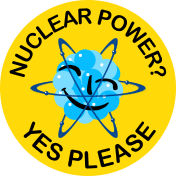Coming to Grips with Countries Reasons for Going Nuclear
While there is much discussion and debate on the Internet over the 'meaning' of the expansion of the worlds nuclear fleet, something has slipped in this discussion over the reason why countries are deciding to go nuclear.
Let's review; dozens of countries have decided to expand their nuclear fleet or, where there is not nuclear fleet, decided to set up the needed nuclear regulatory and safety regime into order to develop such a fleet. This goes against the almost exclusively anti-nuclear decisions of OCED countries such as Germany, Spain, Italy, Japan, Austria, Belgium, Switzerland who have decided to either never build nuclear or, have announced plans to eventually phase it out.
Among those countries taking the opposite direction, either developing new nuclear or expanding existing infrastructure: include: France, Finland, Britain, Vietnam, China, India, Russia, Czech Republic, the United States, Argentina, Brazil, Jordan, Egypt, Saudi Arabia, United Arab Emirates, Turkey, Nigeria, Namibia, South Africa, Kazakhstan, Ukraine, Poland, Indonesia, Malaysia, Bangladesh, South Korea, Taiwan.
I'm sure they are more and obviously, some are more serious than others in going for nuclear energy.
But what are the reasons? Recent announcements by both Poland and the Czech republic show a rather narrow, self-defeating reason, why such as these are going nuclear but scaling back what they previously announced?
One might think "Fukushima" is the reason. They would be wrong. As Fukushima's 3 reactor meltdown was the result of a tsunami combined with an earthquake few of the new reactors will face the scenario the Japanese have influencing their massive reversal of relying on non-carbon nuclear energy for their generation. No, the reasons are far more short-sighted.
In both the Polish and the Czech announcements, and implicit in many of the countries going nuclear in the list above, the reasons given are because they want to fill their "growing" generation needs with non-carbon green nuclear. Sounds virtuous, does it not? But it is not. With the exception of two countries listed above: S. Korea and China…all the countries in the pro-nuclear list are building out nuclear strictly for new generation requirements, not to increase the overall percentage of nuclear as part of their generation portfolio at the expense of fossil generation. That is with those 2 exceptions, no country is developing nuclear to replace fossil fuel, only to mitigate the absolute growth of it within their national borders.
The Czechs were quite explicit: as they don't see an expansion of the market for more generation, they've decided to scale back their original proposed nuclear expansion from 5 reactors to 2 reactors. There was simply zero thought to including nuclear as a way of phasing out fossil fuel. In terms of many of these countries nuclear plans they see nuclear energy as a tool used to increase fossil fuel exports of raw petroleum products.
Russia is a case in point for this. Russia, as a modern industrial economy, has several reasons to increase atomic energy. This includes developing their science-driven economic expansion and development of the Russian Far Ear in co-operation with China; to compete in the international export market for turn-key completed nuclear reactors but also, so they can export their vast quantities of natural gas to Western Europe and China. In other words, while they are building a vast number of new nuclear plants in Russia to provide for expected increases in electrical load, they also want to lower the percentage of natural gas used in the generation of electricity in order sell more in the pipeline network west and south of their country. Russia is also expanding, to limited degrees, their coal generation as well. Since coal is not a major export product for the Russian Federation, no thought, at all, is given to phasing out this dangerous fossil fuel with nuclear energy.
The United States is also a case in point. Recently, the semi-publicly owned Tennessee Valley Authority announced that they will not be requesting the building of new nuclear plants outside the ones already being completed or approved. The TVA touts its' "green" perspectives by throwing rate-payer money at wind and solar.
According the TVA web site http://www.tva.com/power/fsslfax.htm the TVA has "…has 59 operating units at 11 coal-fired-plant sites in the Tennessee Valley." This represents a whopping 46 percent of TVA’s power generation.
Additionally the TVA generation portfolio includes 89 gas turbines which accounts for approx another 20% of it's generation.
The existing 5 nuclear plants represent a huge 30% of it's generation.
TVA has announced the retiring of 18 of it's oldest, smallest, and dirtiest coal plants. But it has also decided to postpone decisions on new nuclear reactors because of an expected flattening of generation demand.
In other words, despite TVA's real or stated efforts to mitigate the awful effects of coal which make up close to half it's generation portfolio only an increase in electrical load would motivate the TVA to consider filling it with nuclear. The idea of actually using nuclear to replace coal is not considered. And this is the paradigm that many utilities and, whole countries have adopted.
Pro-nuclear advocates have to directly confront this with plans, as specific as possible, to substitute to coal with nuclear, either on a parity of MW-per-MW or slightly more to account for general increases in load. We need to reject the notion that nuclear is only good for a generalized increase in load demand and demand it be used to replace coal, and natural gas.
Wednesday, February 22, 2012
Subscribe to:
Comments (Atom)

.png)





